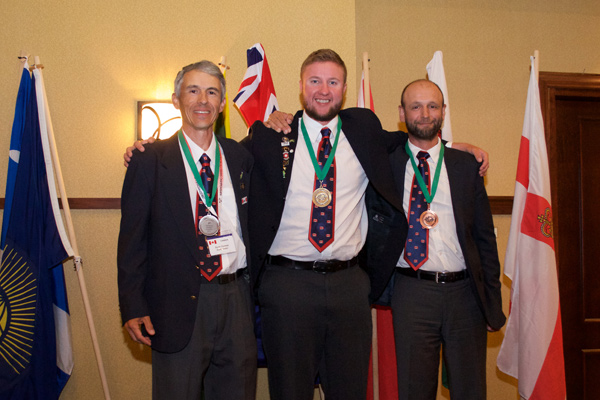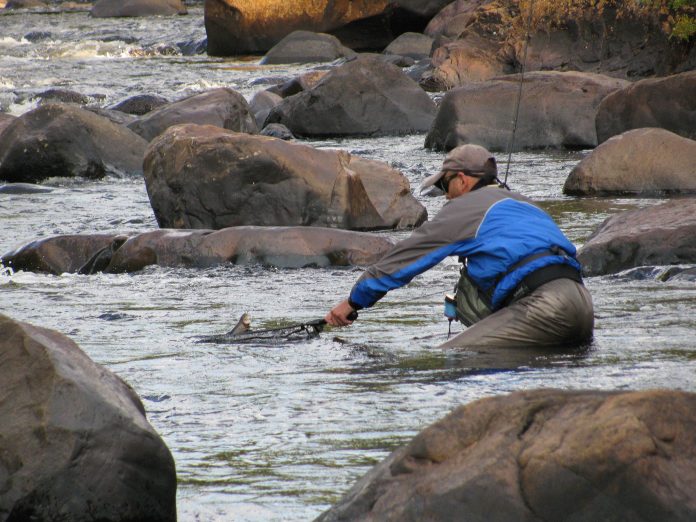Kitchissippi Times: Can you share a little bit of background about yourself to start things off? How did you first get into fly fishing?
Ivo Balinov: I started fishing some 35 years ago in my native Bulgaria. My father was an avid angler: my earliest memories of fishing with him are from when I was 5 or so. But fly fishing came much later, in 1998. My father was not a fly fisherman but he had all sorts of equipment including a fly rod and a book about fly fishing. That made me very curious. And it just happened that one day by pure chance I met some of the most experienced fly anglers in the country who took me under their wing. Once I started fly fishing I never looked back to any other type of fishing. It became a lifetime passion.

KT: Fly fishing is generally perceived as a relaxing summer pastime, not as a competitive sport. How did you go from “hobby” to competition?
IB: Competitions are still a hobby, I do not remember being paid for winning a competition. It is an amateur sport and I believe that keeps it friendlier and a lot more enjoyable. I started competing 11 years ago. The reason was a desire to learn more. Competitors are at the pinnacle of our sport and the most advanced techniques and strategies are usually developed and tested in competition before they trickle down to the mainstream. In a year of competing one can learn more than in 10 of “leisure” fishing. This is not an exaggeration; I have experienced it myself. It is also a very social sport. The National Championships in Canada are the only event that gets together some 50-60 anglers from across the country: a great opportunity to learn from each other and have good time. The Commonwealth Championships are the only event where an even larger group from some 10 countries gets together. And at the World Championships there are often more than 25 countries represented.
Competitions also promote conservation: all fishing is strictly catch and release and special attention is paid to releasing fish unharmed. Barbless hooks are mandatory.
KT: Your team won a gold medal at the 2016 Commonwealth Fly Fishing Championships this summer. Can you tell us a bit about the event itself? And why was this was a historic win?
IB: The Commonwealth Fly Fishing Championships have been taking place every couple of years since 1988. Canada fielded teams at most of them, but until this year a Canadian team never won a medal. This was our first one, it fact the first at any international tournament we have been part of. Events like this are usually won with a very slight margin between the top teams, but we also won with the largest lead in the history of the Championships. In the individual ranking my teammate Colin Huff won the gold, Sorin Comsa from the other Canadian team won silver and was fortunate to win the bronze. My teammate Keefer Pitfield finished a very close fourth. So we placed four Canadians in the top 10. But the individual achievements are of secondary importance, as they would not have happened without the teamwork. A competition of this scale requires a lot of preparation, information sharing and coordination during the competition. Without a strong team an individual cannot go very far. I am very grateful to my teammates for the experience: they were the hardest working, most talented group of anglers I have even been part of and all of them deserved to become part of Canadian fly fishing history!
The competition was done in accordance with the rules of the International Sport Flyfishing Federation. I will not go into details, but to put it shortly: teams consist of five fishing competitors and can also have one substitute, a non-fishing captain and other non-fishing support. Competitors are split in five groups based on a random draw (one competitor from each team in a group). The groups rotate through five different venues over the course of three days. This year we had three different lake venues and two sectors on the Diable river. Every session is three hours. The goal is to catch as many fish as possible within each session. For every session, the top competitor in the group gets one point, the second two points, and so on. The cumulative individual and team points are calculated to come with the final ranking. So the least points lead to the top result.
KT: What does it take to be at the top of your game?
IB: It takes a lot of practice and preparation. You can only get better by competing as there are elements that “leisure” fishing does not strengthen: beyond fishing skills, one needs strong time management, physical fitness for river sessions and also ability to “read the minds” of the other competitors and find out how to be ahead of the game. Good teamwork and team-first attitude is paramount, too; self-oriented competitors usually do not go too far.
One other thing that I find very important is to keep your mind away from either the thought of winning a medal or finishing last and just focus on what matters: the teamwork and the fishing. Our captain this year, Donald Thom, knew that very well and made sure that no conversation about medals took place before we actually won them!
KT: What’s next for you?
IB: I will need to do well at our domestic competitions in order to qualify for the Canadian team that would go to the next Commonwealths in 2018. I hope the rest of my teammates from this year make it too: it would be great to give this team a chance to defend its title. I am also involved in the organisation of competitions under the Eastern Canadian Fly Fishing League. Any anglers interested to join these events can connect with me: it is very friendly and newcomers of all ages are welcome. I also spend some time as a fly fishing instructor. My website is ibflyfishing.com.
KT: The fly fishing season must be over for the time being. What are you planning to do over the winter? Travel, training, or both?
IB: I will probably fish a couple more times before it gets too cold. Fishing for trout is actually excellent in the fall, usually better than the summer. Then I will slow down and rest until end of March when it all starts again. It has been a busy season for me as I’ve participated in several domestic competitions. The winter is a good time to tie flies for the next season. Sometimes I fly fish in the Caribbean but that is completely “leisure” fishing, no competitions there. 🙂
